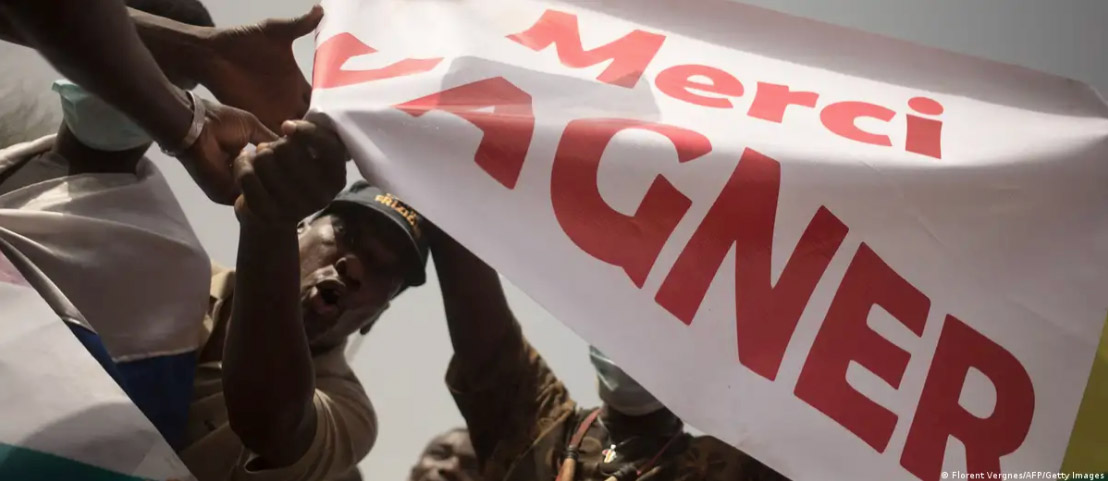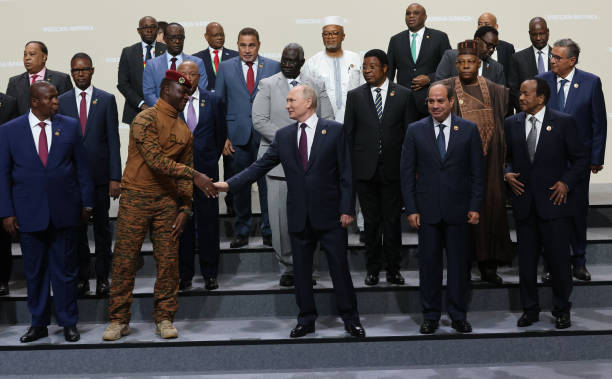Last week, Russian President Vladimir Putin solemnly suggested that the detonation of hand grenades by passengers under the influence of alcohol and drugs caused the plane crash in August that killed the head of the Wagner Group, Yevgeny Prigozhin.
This bizarre explanation – the latest in the Kremlin’s sizeable compendium of disinformation – was a blatant attempt to discredit the mercenary group leader in the eyes of his domestic and international backers.
Many of these supporters, particularly in Africa, will be wondering what is to become of the Wagner Group and, more specifically, of Russian support for their regimes. The private military company, labelled a terrorist organisation by the US and UK only last month, was arguably the main driver for the increase in Russian influence in Africa over the last decade.
Known as ‘Putin’s chef’, Prigozhin was a master at identifying and exploiting the lucrative political and financial opportunities that the fragile African states offered. He drew on Wagner’s corporate network to exert Moscow’s influence in troubled hot-spots from Central African Republic (CAR) to Libya and, most recently, the resource-rich Democratic Republic of Congo. Expert observers assess that Wagner was actively using disinformation, based on expertise from the Prigozhin-built troll factory, the Internet Research Agency, to interfere in nearly half of Africa’s nations. All this on a conveniently, if speciously, deniable basis.
The recipe for building influence was simple. Targeting isolated, politically illegitimate and unpopular leaders, Wagner offered support – through an orchestral mix of paramilitary boots on the ground, disinformation campaigns, political interference, and the provision of arms – in exchange for access to natural resources, including oil, gold, diamonds and uranium. Mining operations in CAR alone reportedly generate nearly $1 billion for the Wagner purse alone. With its costs covered by these lucrative concessions, the Kremlin had developed a nimble, adaptive and deniable geopolitical weapon focused on undermining the West and disrupting stability throughout Africa.

The question now is how Moscow will act to consolidate the gains made by the Wagner Group, in the awkward absence of Prigozhin. Several unconfirmed reports suggest that the private military company will be run by Andrei Troshev, a former soldier and policeman. Already a senior figure within Wagner, Troshev refused to take part in Prigozhin’s mutiny. Last week, he was filmed in the Kremlin, with Putin instructing him to “form volunteer battalions” that would likely include Wagner fighters. Whether or not hardened fighters aligned with Prigozhin will join him is not clear.
What is clear, however, Russia will no longer have plausible deniability over the human rights abuses, civilian deaths and territorial annexations carried out by Wagner fighters. Pleading ignorance will no longer work. After the coup attempt, Putin cannot pretend he does not have total control over Wagner. Instead of being an arm’s length tool of Russia’s foreign policy, Wagner will be outed as the repressive and thuggish face of Putin’s foreign policy that it is.
While the Kremlin’s bureaucracy will not be as agile as the private military company, there will be a determination to maintain the asymmetric capability. Politically, Russia has been making overtures to its client states where Wagner has a significant presence; on the day of Prigozhin’s death, deputy defence minister Yunus-Bek Yevkurov was reassuring General Haftar in Libya of the Kremlin’s commitment to him, before then visiting military leaders in Mali and Burkina Faso to do the same. Sergey Lavrov, Russia’s veteran foreign minister, has for some time been working the continent — visiting up to twice a month — in an effort to win support for Russia.
Diplomatically, most African states have taken a cautious approach to siding with Russia since the outbreak of hostilities with Ukraine in February 2022. A UN resolution in 2022 condemning Moscow’s aggression in Ukraine saw not a single African country voting against, 25 supporting the motion and the rest abstaining or staying away. Some nations, notably Kenya, Ghana and Liberia, have spoken loudly against Russia’s invasion of Ukraine. In early 2023, Botswana snubbed Lavrov when he tried to visit Gaborone. Zimbabwean President Emmerson Mnangagwa is one of the few to support the invasion of Ukraine openly, but with his country just over an election that even the regional grouping rated as ‘not free and fair’, Harare is short of friends.
This summer, only 17 African leaders attended the much-heralded Russia-Africa Summit in St Petersburg, a marked drop from the 43 who attended the conference in Sochi in 2019. The majority voiced concern at the impact of the invasion on food prices. Russia itself was a grain-seller to the world before sanctions, and the price of basic foodstuffs has gone up.
Much of Africa’s wheat used to come from Ukraine via the Black Sea ports, including for the World Food Program to relieve famine in dry or war-torn regions like Sudan. Not anymore. Having withdrawn from the Black Sea Grain Initiative, Russia has doubled down on its export of agricultural commodities, bolstered by grain produced in occupied regions of Ukraine and a bumper harvest. In a clear sign that support for Russia can have its benefits, Putin promised free grain to six African countries: Burkina Faso, CAR, Eritrea, Mali, Zimbabwe and famine-hit Somalia.
But this will not be enough for most African governments. UN Secretary-General Antonio Guterres was clear that grain donations from Russia cannot compensate for the deal, while the Kenyan government called Russia’s withdrawal a ‘stab in the back’. The leaders of Egypt and South Africa were equally outspoken, and for good reason. On a continent where 600 million have no electricity and almost as many lack a tap in the home, even a small hike in the cost-of-living sees hunger on the rise and stability come under threat. In some countries, the most single predictor of domestic unrest is the wheat price. Many African leaders now have cause to blame Putin for unrest at home.
This is the key issue for Russia in Africa: the Kremlin does not have much to offer to other states. The rouble is losing value, the army is overextended, diplomatic outreach is stretched and increasingly threadbare, and the coffers are empty.
Russian trade with the entire continent comes in at $17.3bn a year, with Algeria, Egypt and Morocco accounting for two thirds of Moscow’s business. The US does more than that with South Africa alone.
In fact, the only area where trade is burgeoning is with weapons; in 2022, Russia overtook China as the leading arms seller in sub-Saharan Africa, with a 26% share of the market. If you include North Africa, which takes in long-term Russian clients like Algeria, this proportion rises to 40%. It is not clear whether even this trade can be maintained, as the war in Ukraine carries on.
Unlike China, the Kremlin brings next to no investment, no job creation and no security for client regimes, while Prigozhin’s abrupt end must also give leaders pause for thought.
Putin’s influence in Africa hangs in the balance. With the Wagner Group facing an uncertain future under uncertain leadership, even its ability to shore up isolated regimes and push disinformation is under threat. The Russian president must find new ways to draw leaders into Russia’s orbit, but it is not clear whether he can offer anything more than his chef’s original recipe of disruption, exploitation and brutality.
